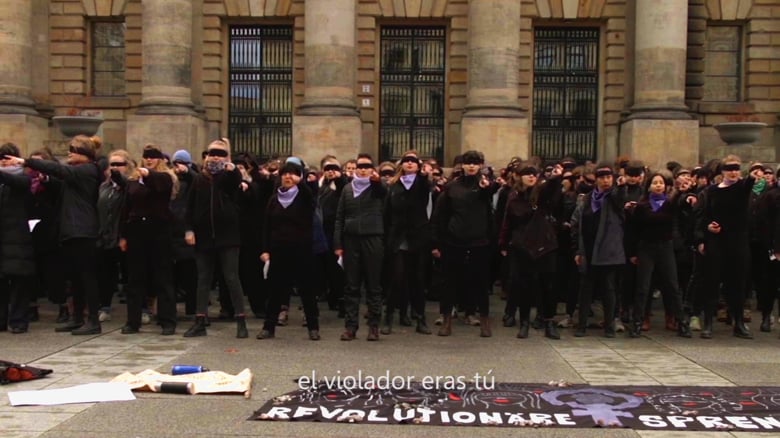The banging of pots, pans, and wooden kitchen spoons together might not seem like a particularly defiant or political image. Yet for Chileans, this action—known as cacerolazo—has been emblematic of decades of struggle and civil resistance against oppressive regimes in the country. It is also the thread that brings together the films screened in the docuseries Chile in Revolt, presented weekly at UQÀM from Jan. 16-31.
A protestor and her pan foregrounds the first shot to the prologue of Chile in Revolt: At an intersection further behind, riot-policemen are seen fighting a handful of protestors. The protestors’s chants and the tinting sounds of her pot are muffled because of the brawl in the background. The second scene is shot along a Santiago highway emptied of traffic, where riot-police are seen shooting rubber bullets and aiming water cannons towards a dozen protestors, then retreating with apparent indifference as the street goes up in flames.
The prologue comprises only these two shots and lasts barely over a minute. The effect is nonetheless chilling: The camera remains still throughout, giving an uncanny sense of stability unfitting with the scenes of violent confrontation the film seems to imply that, in these environs, there is normalcy in such events.
Era Necessario offers a much more vibrant depiction of the 2019 Chilean protests. Here, thousands of Chilean women from all ages and backgrounds have gathered in the streets of Santiago, chanting and banging their dishes, demanding action against sexual violence in the country. Chile has a historically dismal record of sexual violence and the rate of rape in the country are among the highest globally. However, the tone of the film remains hopeful, focusing instead on the sense of solidarity between Chilean women and the sense of community fostered by the protests.
Movilizados depicts the 2011-2013 Chilean student protests against the Sebastian Piñera government and the brutal police repression that ensued. While a bit long-winded, a few powerful moments stuck out. In one, an elder woman tries to convince a barricade of riot-police officers that their work is perpetuating injustices: “If you are here, it is because you are poor like us,” she tells the expressionless officers. The documentary could use more of such candid confrontations where the Chilean struggle is at its most intimate and spend less time on its numerous and often tedious interviews.
Chile in Flames brings viewers to present-day Chile, where civil defiance by high school students to a 30-peso increase in weekly transit fees in Oct. 2019 quickly turned into a large-scale protest for widespread social reforms. The documentary follows the events chronologically, from the millions marching the streets of Chilean cities demanding better living conditions to the government’s refusal to back down by sending armoured vehicles and riot police to quell the protests. In the end, Chileans defy en masse new curfew laws and continue to demonstrate—with the tinting sounds of the cacerolazo as their weapon of resistance—until the government has cancelled the fare increase, and promised new social reforms.
Of all the documentaries screened, Chile in Flames is the most forceful. It juxtaposes horrific images of burnt down subway trains and brutal police repression reminiscent of Augusto Pinochet’s Chile with powerful human narratives of shared struggle. While the previous documentaries often give the impression that civilian protests merely contribute to a never-ending cycle of violence, Chile in Flames shows a population united by resistance and capable of achieving concrete improvements to people’s lives. It is a neat conclusion to the docuseries: in a country where the status quo has rarely ever yielded to the masses, the film brings hope that institutional change might really be possible in Chile.








